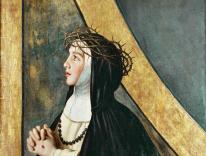Perhaps an even greater theologian than Thomas Aquinas (do I hear groans emanating from the Dominican House of Studies?) also lapsed into a rich and evocative silence towards the end of his creative life.
In the notes for his recent recording of Johann Sebastian Bach’s The Art of Fugue, Andrew Rangell writes: ”[Bach] unquestionably regarded it as a summa of his art.” He further states:
The final movement, a huge unfinished fugue, has engendered enormous comment and speculation. Having the appearance of a triple fugue, it presents three themes in three sections, the last theme (B flat, A, C, B natural) spelling the name Bach in German nomenclature. There can be no doubt of the significance of this signature, in this piece, in this moment, in both the life of this piece and the life of the composer. Momentous as this entrance is, its exposition has been barely completed when, stunningly, the fugue “goes silent.”
And somehow, the shock of this silence remains undiminished at every new hearing.
It is as though the great musician-theologian allowed his music and his person to fade into the fecund silence of eternity, fully embracing the prayer inscribed at the end of all his works: Soli Deo Gloria!

